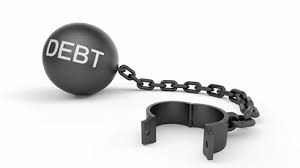Financial Spring Cleaning Viewed Through 12 Step Recovery
 At some stage in recovery, we start to take responsibility for our actions and the wreckage of our past. But many of us are afraid to address the financial wreckage. We are quick to make amends to friends and family and to do whatever it takes to make it right with them but when it comes to situations with our own finances, we often freeze like deer caught in headlights.
At some stage in recovery, we start to take responsibility for our actions and the wreckage of our past. But many of us are afraid to address the financial wreckage. We are quick to make amends to friends and family and to do whatever it takes to make it right with them but when it comes to situations with our own finances, we often freeze like deer caught in headlights.
We may have many money issues…overdrawn accounts or no accounts…written bad checks…owe money to the government for unpaid or unfiled taxes…maxed out credit cards…Even if our financial situation did not become that dire, we may still be finding it hard to make the money we do have stretch from one payday to the next. Each person’s situation is different and there is no “one size fits all” method of taking financial lemons and creating lemonade.
But there are some tools, which if implemented, might help to untangle some of the mess we have made and allow us to do some financial spring cleaning. (If your financial situation is very complicated, I highly recommend working with a financial coach. That person can do two things for you — one is to help you work your way out of a debt quagmire. The other is to help you to start to make better choices for yourself going forward. These are not mutually exclusive and a good coach will be worth the cost of the service.)
Backing up just a bit, there are several key suggestions I would make to start the house cleaning process. Just as we do a moral inventory in the Fourth Step of a 12 step recovery program, I advocate for doing a financial Fourth Step. It is not as complicated as it might sound. When we start our Fourth Step, we have incredible anxiety…we are afraid to face the harms we have done, the resentments we harbor, the behaviors we had that caused us to feel shame in the past. And yet, we are guided by a sponsor who helps us to understand that shadows of our past lose much of their power over us when committed to paper so that they can see the light of day. We do the same thing with a financial inventory.
We begin by making a list of every person or entity to which we owe money, how much we owe them and what the payment terms are supposed to be. We do this fearlessly, because regardless of whether you owe $100, $10,000 or $100,000, it is what it is and it is not going to go away by ignoring it. We can’t begin to fix our financial problems until we know the extent of those problems. The other thing we know in recovery is that we didn’t become addicts overnight and we are not going to be graced with complete recovery overnight either. It is a process. So, when we look at our financial inventory, we recognize that it will take time to fix the problems. And, just as when we do our Ninth Step amends, we are told that it does not matter if some will not accept our amends, but rather that we have made them: so too, there may be some financial matters that cannot be fixed. If we have such issues, we face them and figure out what the next right thing is to do.
We also make a list of our current needs….NOT WANTS … that are necessary to maintain life….the cost of a place to live, food to eat, clothing to cover us and transportation to our employment. We learn to live on less, until we have made financial amends. We learn to not live beyond our means. There are some specific steps we can take, especially with the advent of technology, to live on what we have. We can find you tube videos to teach us how to balance a checkbook. This is a skill that is invaluable. Just checking your balance at an ATM is not useful, as there might be checks that have not yet cleared your account and therefore, you may have less in your account than you think. We can also seek sources to help us financially. For instance, we seek out local food banks or co-ops to supplement our grocery budget. Many pharmaceutical companies will provide medications for little or no charge to those with modest incomes. Some utility companies can provide subsidies to reduce the monthly cost of heat or water service. Sometimes churches can help with a little bit of financial support to deal with a “one time” issue.
… that are necessary to maintain life….the cost of a place to live, food to eat, clothing to cover us and transportation to our employment. We learn to live on less, until we have made financial amends. We learn to not live beyond our means. There are some specific steps we can take, especially with the advent of technology, to live on what we have. We can find you tube videos to teach us how to balance a checkbook. This is a skill that is invaluable. Just checking your balance at an ATM is not useful, as there might be checks that have not yet cleared your account and therefore, you may have less in your account than you think. We can also seek sources to help us financially. For instance, we seek out local food banks or co-ops to supplement our grocery budget. Many pharmaceutical companies will provide medications for little or no charge to those with modest incomes. Some utility companies can provide subsidies to reduce the monthly cost of heat or water service. Sometimes churches can help with a little bit of financial support to deal with a “one time” issue.
We may owe a great deal of money on mortgages or in back taxes. There are some options short of filing for bankruptcy. A key to remember is that some bills need to have higher priority than others because of the consequences associated with not paying them. Many people don’t realize that if they don’t pay their mortgage regularly or don’t pay their taxes owed, or work out a payment arrangement with their mortgage holder or the revenue service; they could find themselves looking at foreclosure and loss of their home. Most banks do not want to be in the business of owning real estate and will work with you on a refinance of your mortgage, perhaps to lower your monthly payments but extend the length of the mortgage.
We might also have significant credit card debt. Sometimes if we contact the credit card companies, they will be willing to work with us on partial payments and may even be willing to waive certain fees and interest in order to get the balance paid. I recognize that negotiating settlement of debt or filing for bankruptcy will make an impact on a credit rating. However, at this stage, we put our ego aside. If we are very over extended, our credit rating is already in the toilet. We don’t want to let our pride stand in the way of being able to build a more solid foundation to move forward.
As I stated earlier, each person’s financial situation is individual. Just as each person finds their own way to work through their moral inventory, so too must each person find their way through their financial inventory. What works for one person will not necessarily work for another. Just as it is best to work the steps of recovery with a sponsor, so too, it is best to work on the steps of financial recovery with a financial coach. Whether you need a year’s worth of guidance and support or only a few sessions, it can be the best investment you make to help you move forward.
As a life coach I encourage you to consider that financial coaching is one of the transformational activities we can engage in as part of a coaching relationship. Please feel free to contact me at jackie@anewwayoflifecoaching.com or by phone at 412-626-7801 to schedule a complimentary session to discuss your coaching needs, including financial coaching.